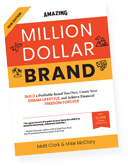Amazon FBA vs. Real Estate for Passive Income
Want to learn how to generate passive income with unlimited earning potential and get your life back? Let’s consider which is the best opportunity, Amazon FBA vs. real estate.
Passive income generates long-term cash flow with limited time commitment (i.e. you don’t trade time for money). You have to invest some time and some money upfront to set up a passive income stream — but once it’s up and running, the business takes care of itself.
Here are a few passive income examples:
• Amazon FBA businesses
• Real estate investments or rental income
• Limited partnerships
• Dividend stocks
• Affiliate marketing
In essence, passive income sets you free from the commitment of a full-time job, or even multiple jobs. Since you no longer trade time for money, you have the power to explore other ventures.
This guide takes a look at two of the passive income models listed above: Amazon FBA businesses and real estate investments or rental properties. Let’s explore both models (and the pros and cons of each) in depth.
What is Amazon FBA?
The Amazon FBA program lets online sellers outsource Amazon’s warehouses, shipping infrastructure, and customer service team. So, instead of storing your own products and shipping them one by one, you send your products to Amazon in bulk and they take care of the rest in exchange for a reasonable fee.
Is an Amazon FBA business as passive as it seems?
Yes! When we compare an Amazon FBA business model to how passive income works, it lines up perfectly. Sellers invest some time and money upfront to identify or create a competitive product and then market the product accordingly.
It’ll take some time to grow positive Amazon reviews for your product but once that happens, it’s no longer a daily commitment. It’s a business that runs itself with unlimited earning potential.
What is real estate investing?
When most people think about real estate as passive income, they usually picture rental properties. In short, you buy an apartment complex, a house, an office building, and so on. Then you fix it up (if needed) and rent it out. Whatever profit is left over at the end of the month is yours to keep.
Is real estate as passive as it seems?
Technically, real estate is passive if you do it right and have enough capital. First, you’ll invest money on a down payment, and you’ll need some time to find the right tenants. But hopefully once each unit or building is rented out, it’s hands-off … right?
In reality, you’ll have to deal with tenants breaking leases, evictions, paperwork, background checks, maintenance calls, and more. If you have enough money, you can hire a property management company to take care of these issues for you — but it’ll cost you a relatively high percentage of each month’s revenue.
In short, after you account for the cost of your rental property’s mortgage, maintenance, and so on, you’re likely left with a few hundred dollars that took you several hours (or even days) to earn. And unless you can afford to diversify (or buy more than one property in more than one location), your earnings are strictly limited.
Amazon FBA vs Real Estate For Passive Income:
To answer this, let’s take a look at the facts and compare apples to apples. Here are the criteria we used to evaluate each business model.
Earning potential:
Whether the business model inherently caps earnings over time. Unlimited earning potential means there is no cap, limited means there is a cap.
Monthly profits:
When you subtract monthly expenses from monthly revenue, how much is left over for you to keep?
Diversification:
How easy is it to diversify your portfolio? Can you spread your eggs out into different baskets?
Short-term time commitment:
How much time does it take to get the business up and running?
Long-term time commitment:
After it’s set up, how much time does it take to keep the business running each month?
Upfront costs:
What is the barrier to entry? How much money does it take to get started?
Risk:
How agile is the business model? Can you lose your investment?
Valuable asset you can sell:
Can you sell the business you’ve built for a profit? Is it an asset?
| Amazon FBA | Rental Properties | |
| Earning potential | Unlimited | Limited |
| Monthly profits | High | Low |
| Diversification | Yes | Limited |
| Short-term time commitment | High | High |
| Long-term time commitment | Low | High |
| Up front costs | $1k – $10k | $10k+ |
| Risk | Low | Medium |
| Valuable asset you can sell | Yes | Yes |
As you can see above, when we compare Amazon FBA vs real estate, the answer is obvious. An Amazon FBA business can earn more money over time with less money upfront than rental properties. You’ll also spend less time and money to maintain an Amazon FBA business over time than you will with rental properties, and there’s less inherent risk. Plus, if you work with the right partner, you can start an Amazon FBA business with a money-back guarantee and step-by-step instructions on how to start one of your own.
How to start a successful passive income business
The first step to financial freedom is with Change Your Life With Passive Income — the FREE eBook by Matt Clark, Chairman and Co-Founder of Amazing.com. Inside you’ll find valuable information about how entrepreneurs across the globe are changing their lives and setting themselves free forever.
Discover several passive income business models and learn how each of them could work for you. So take the first step toward financial independence and build a passive income business that’s proven to work. It all starts when you uncover the secrets of unlimited earning potential and figure out how to escape the “time for money” cycle — and this eBook has those secrets.
Amazing.com has helped countless entrepreneurs just like you — and plenty of them started with the eBook: Change Your Life With Passive Income. Check out this incredible, FREE resource today!
Get My FREE eBook Now!
Find your first--or next--product to sell fast
Discover top-selling products on Amazon. See accurate sales trends and profit estimates so your next product succeeds. Plus, plan out your entire product and brand with a new custom AI tool unavailable anywhere else.
Heading 1
with a request body that specifies how to map the columns of your import file to the associated CRM properties in HubSpot.... In the request JSON, define the import file details, including mapping the spreadsheet's columns to HubSpot data. Your request JSON should include the following fields:... entry for each column.


